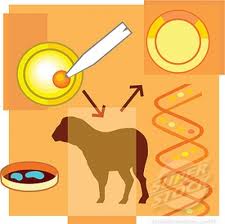The institute organize graduate, postgraduate and doctoral studies in the fuild of animal biotechnology, animal genetic engineering, management of animal health, nutrition and control, food safety of animal origin, milk and dairy products, genetics and selection and etc

The institute organize graduate, postgraduate and doctoral studies in the fuild of animal biotechnology, animal genetic engineering, management of animal health, nutrition and control, food safety of animal origin, milk and dairy products, genetics and selection and etc. Except the educational role the institute main research goes trough laboratory for GMO and Genetic Engineering. At the request of the Ministry of Environment and Physical Planning in 2002 was a study on biosafety by the Head of the Laboratory of Biochemistry and Molecular Biology, in which extensive modifications were made possible, the manner of their creation, the levels of security depending on the type of modification of the organism in which it is created and the then state of the field in Macedonia. In cooperation with the International Atomic Energy Agency since early 2005, Laboratory of Biochemistry and Molecular Biology of the Faculty of Agriculture and Food participated in a project titled "Improving the system of food safety in the Republic of Macedonia", which is focused on establishing system to control the presence of genetically modified organisms (GMO) in various types of food products. In June 2005, the laboratory was equipped with an automatic DNA analyzer, Real-time PCR and a new camera for documentation of the gels. Within this project were made and training of team members at the Institute for the Control of Foodstuffs in Lower Saxony, Department of Genetic Engineering and Laboratory for GMO control at the National Institute of Biology in Ljubljana, Slovenia, two renowned institutions the field of GMOs. This project was entirely funded by the International Atomic Energy Agency for a total of about 250,000 Euros. Ministry of Health, which includes a Directorate for Food, issued in 2006 authorizing the Laboratory of Biochemistry, Molecular Biology and GM at the Faculty of Agricultural Sciences and Food for the control of GMOs in different foodstuffs. Except for routine laboratory analysis and actively participate in the development of professional tests organized by the ISTA (International Seed Testing Association) proving the competence of staff and quality equipment that performed the analysis. But during the analysis down to a small percentage of GMO present in a nutritional product, there are many critical points that can lead to unrealistic results. The laboratory used different measures in order to maximally avoid these critical points. However, the rapid development of analytical techniques today shows that there are alternative methods that are far faster and have greater accuracy in terms of ever used. Moreover, the application of such methods in most cases shortens the time for analysis by reducing the procedures and thus the price of each copy skriniranje drastically decline. Except in the field of GM laboratory participated in the implementation of other projects in the field of genetic engineering and biotechnology. Because of their number on this occasion would only mentions: project "Application of molecular marker for stress syndrome in selection of pigs," project "Application of molecular markers for dairy proteins (κ-casein and β-aktoglobulin) in selection of dairy cows and sheep, an international project entitled "Identification and conservation of animal genetic resources in Southeastern Europe", financed by the Agricultural Faculty in Oslo, Norway and the project proposal TSE genotyping and breeding program in small ruminants in the Republic of Macedonia "
According to wikipedia.